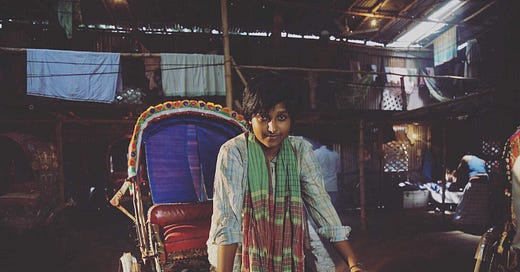Rickshaw Girl
This spare, low-budget charmer looks at the life of a poor Bangladeshi girl who travels to the big city and disguises herself as a boy in order to support her family.
There isn’t a lot of money or production values behind “Rickshaw Girl,” but there is plenty of heart. It’s a spare, simple story about a Bangladeshi girl who masquerades as a boy so she can work in the big city and support her family.
Novera Rahman plays Naima, a sweet but strong-willed girl of about 16 whose father (Naresh Bhuiyan) is a rickshaw driver who has fallen behind in his payments to the local strongman due to illness. She loves to paint, and everything in and around their home, from the corrugated aluminum walls of their humble shack to her dad’s rickshaw have been decorated in pleasing, colorful designs.
Her favorite motif is bird figures, and it’s no wonder as Naima longs to break free of the poverty and patriarchal society she’s grown up, which tells her she has little value because she’s female.
Naima has often filled in for her father when he’s been unable to pedal his rickshaw, but the men who run the garages, sort of like a taxi cab hubs, insist women aren’t strong enough to work in the hot sun toting customers about. When her dad falls ill and becomes bedridden, needing expensive medicine to function, his rickshaw is confiscated and it seems the family is on the verge of being left homeless and destitute.
With the help of a friend, Barek (Allen Shubhro Gomes), who runs a charter bus service, she runs away to the big city, Dhaka, hoping to make some money as a maid to help her family. She’s set up with a wealthy young couple, but is shocked to find girls in her position are treated little better than slaves — even being locked up when her ‘mistress’ is away.
She wisely beats it at the first opportunity, falling in with some street kids who make money anyway they can, including participating in political protests. You get 100 Taka for marching, but 200 if you get in a fight, another girl advises. (That’s $1.93, folks.)
Naima wanders into one of the big rickshaw garages and is shooed away once again. She finally decides to cut her beautiful long sable hair, dress in pants and shirt and tries again. This time she is welcomed and, after an initial slow start, stars earning enough money to send home with Barek.
She also begins to exercise her artistic muscles again, and soon her red-colored rickshaw is covered in beautiful painted designs. This earns her the notice of a PA at one of the local film studios, where she’s brought in as a background extra and even gets a handsome tip from star Siam Ahmed (playing himself).
Of course, her good fortune is going to lead to some jealousy, and one guesses it’s only a matter of time before her gender swap is discovered and Naima finds herself in another crisis.
Directed by Amitabh Reza Chowdhury from a screenplay by Sharbari Z. Ahmed( and Naseef Amin, based on the novel by Mitali Perkins, “Rickshaw Girl” is a tender-hearted bit of romantic fantasy — not the amore kind, but in the sense Naima has the soul of an artist but is stuck in the trap of family and cultural expectations, and yearns to find self-validation and love.
Despite the low production values, it’s a lovely-looking film that captures all the chaos and bustle of the streets of Bangladesh. There is even an animated sequence that, while decidedly low-dollar, reflects the sweet and simple charms of this story.
“Rickshaw Girl” is available for rental on many streaming platforms including Apple TV+, Amazon, Hoopla and Kanopy.





